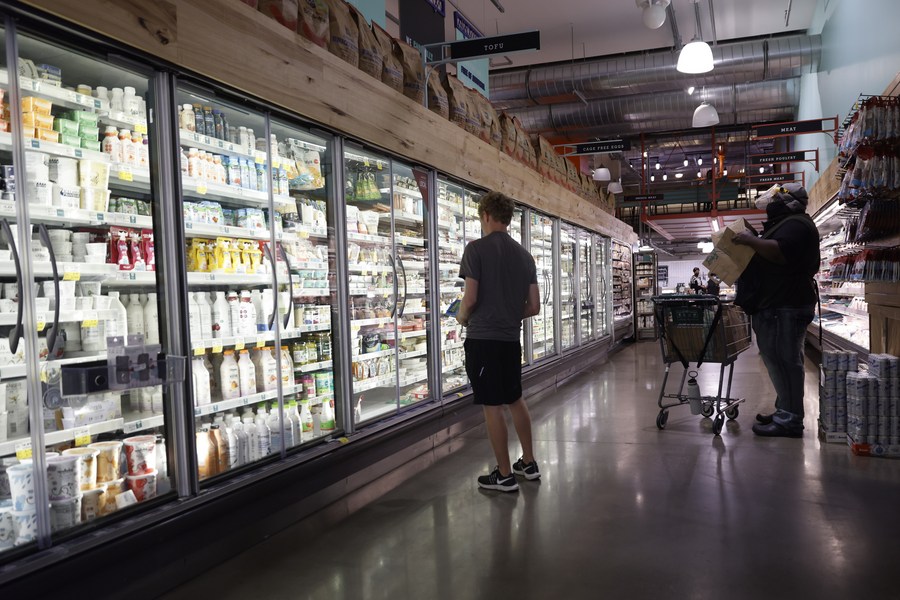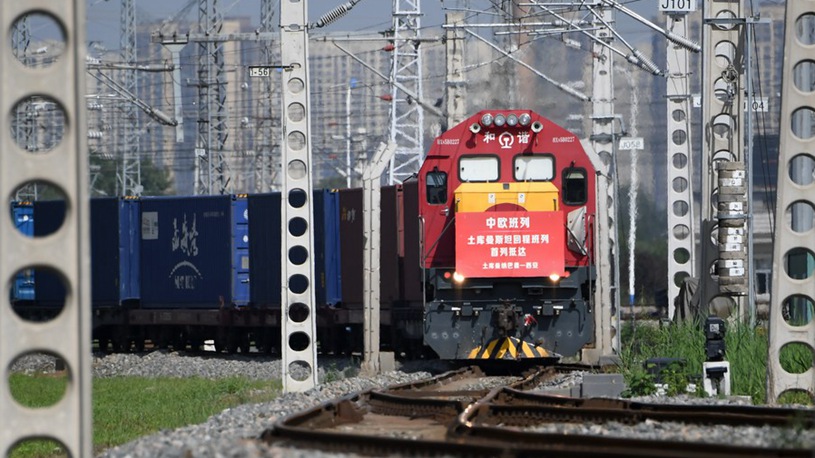American public pays high price for rising inflation
"Inflation hurts. It causes pain, people get unemployed, prices go up," says Khairy Tourk.
CHICAGO, Sept. 15 (Xinhua) -- Case Wener is a support engineer at a local business in the north shore of Chicago. His family used to eat out frequently and take more trips, but high inflation has changed their way of life.
"We're on a moderated income, so we do have to cut our spending. We don't go out as much. Now the trips are more local," Wener told Xinhua. "The other controlled expenditures include utilities. It had us change our habits for water, gas and electricity."
A part-time student at a local community college and a part-time mechanic at a landscape company, Daniel Mcgue, 23, is used to take Uber taxis and drive his own car. "But because of the inflation, I tend to use public transportation, ride my bike, or get a ride from a friend or family member more frequently," he said.
Latest data from the Labor Department show that U.S. inflation jumped to a new four-decade peak in June this year, as the consumer price index soared 9.1 percent compared with a year earlier, the highest since November 1981. Though the index eased to 8.3 percent in August, it is still close to a multi-decade high.
As for income, the latest data from the University of Michigan Surveys of Consumers show that though more than half of consumers surveyed in August expect their incomes to grow over the next year, only 18 percent expect their income growth to exceed inflation.

People shop at a supermarket in San Mateo, California, the United States, Sept. 13, 2022. (Photo by Li Jianguo/Xinhua)
"Inflation hurts. It causes pain, people get unemployed, prices go up," Khairy Tourk, professor of economics at the Stuart School of Business, Illinois Institute of Technology in Chicago, told Xinhua. With prices of foods, energy and rent going up, it is the people that are going to be hit severely, Tourk said.
"The pain will be felt throughout the society except for the upper 20 percent," he added. "What we will see is a shrinking of the middle class."
Both Federal and local governments have tried to curb inflation, Tourk said, naming the forgiveness of student debt, the 1.9-trillion-U.S.-dollar fiscal policy to stimulate economy, and rent controls by some local governments. But "most of these policies will not have really much effect because inflation is going to be with us for many years to come."
Tourk attributes the root cause of inflation to a too rapidly-growing money supply and the Federal Reserve's favorable policy for Wall Street.
"It's always easy to use the printing money machine to increase spending. We are paying a high price for these policies," Tourk said.

People shop at a local supermarket in Washington, D.C., the United States, Sept. 13, 2022. (Photo by Ting Shen/Xinhua)
A poll of economists by Reuters in late August put the chance of a U.S. recession within a year at 45 percent, and a Bloomberg survey conducted in July put the probability of a downturn at 47.5 percent.
Tourk is not optimistic about the future, saying the chances of the United States falling into a recession are not small, and the question is how severe the recession would be.
"In the last three decades, we have witnessed a decline in educational standards. We have witnessed a decline in real investment," he said.
Photos
 Park in S China's Shenzhen celebrates 19th birthday of giant panda during Mid-Autumn Festival
Park in S China's Shenzhen celebrates 19th birthday of giant panda during Mid-Autumn Festival China Fashion Week S/S 2023 concludes in Beijing
China Fashion Week S/S 2023 concludes in Beijing China-Europe freight train services see robust growth in August
China-Europe freight train services see robust growth in August Teenager from SW China's Yunnan gains widespread fame for steadfast dedication to sport of tennis
Teenager from SW China's Yunnan gains widespread fame for steadfast dedication to sport of tennis
Related Stories
- Muslims in U.S. still living under Islamophobia decades after 9/11: U.S. experts
- Politicians turn blind eye to U.S. teacher shortage: USA Today
- U.S. schools desperate to find affordable housing for struggling staff: survey
- Feature: U.S. veterans' protests warn against link between militarism, climate crisis
- 26,000 students caught with firearms on U.S. campus in last decade: federal data
- U.S. criticized for rolling out COVID boosters without human trials: FT
- Four out of every 10 gun deaths in U.S. cities are suicides: analysis
- Homicides down but violent crime up in major U.S. cities: survey
- Slavery, racism connected to U.S. gun ownership: report
- First U.S. monkeypox death confirmed in California
Copyright © 2022 People's Daily Online. All Rights Reserved.





